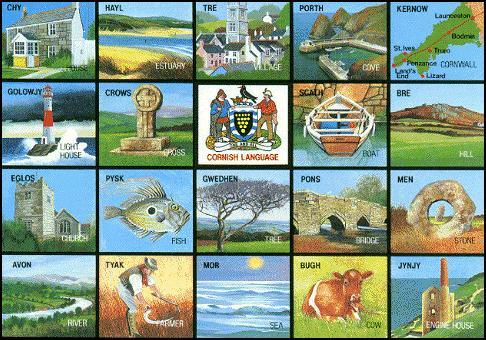


Web: www.cornish-language.org
Web: www.cornishdictionary.org.uk
By Tre, Pol and Pen shall ye know all Cornishmen
All over Cornwall you will see cars emblazoned not with GB stickers but with the flag of St. Piran, often accompanied by the word 'Kernow' (Cornish for Cornwall). This white cross on a black field represents not only the tin for which Cornwall is so famous but also a fiercely independent spirit.

The Cornish Language went from being the universal language of the population of Cornwall in 1300 to extinction by 1900. It has had a certain revival since then. Today after much spending of government money, about 300 people appear to speak the language with some knowledge. However these few are split into 3 camps, each promoting their own version of the language, with differing pronunciation and spelling.
There was a tribe called the Dumnonii, who inhabited most of south west Britain including Cornwall. Cornish started to evolve as a separate language around 2000 BC.
Cornish continued to develop as a separate language until the 17th century, then started to decline as English became the language that was necessary to succeed. Cornish became looked on a the language of the poorer people. The church acted as a further stimulus for English as the Prayer Book was only published in English. In fact there was a major uprising in Cornwall in 1549 against the imposition of the English Prayer Book.
After about 1700 the Cornish language declined rapidly with the death of Dolly Pentreath of Mousehole, generally acknowledged as the last person to have exclusively spoken Cornish. Chesten Marchant, who died in 1676 at Gwithian, is believed to have been the last monoglot Cornish Language speaker. In the 20th century however, there has been something of a revival, with an increasing interest in learning and preserving Cornwall's ancient language.
In recent years Henry Jenner has spearheaded a move to revive the Cornish Language, and grammars, dictionaries and magazines in the language have been published. The Cornish language (referred to as Kernewek by its speakers) stands out among other lesser-used languages of Europe because it is a language that has been revived after having died out.
Wilfred Melville Benetto was the author of the first full-length novel in Cornish in 1984. He was elected a member of Gorseth Kernow under the Bardic name of Abransek ('Bushy-browed One') in 1968.
In 2003 the Cornish language is recognised under the Charter for Regional and Minority Languages and the Government has provided up to £150,000 a year to support its development.
Many books are now available in Cornish, and there is a movement by some to have Cornish road signs. Many main roads into the county have the name Kernow as well as Cornwall.
| English | Cornish |
| Cornwall | Kernow |
| Cornish | Kernewek |
| Good day | Dydh da |
| Good morning | Myttin da |
| Good afternoon | Dohajydh da |
| Good evening | Gorthugher da |
| Good night | Nos da |
| Welcome | Dynnargh dhis |
| How are you? | Fatla genes? |
| What is your name? | Pyth yw dha hanow? |
| Where are you from? | Ple'th os ta trigys? |
| Pleased to meet you | Da yw genev metya genes |
| Hello | Hou |
| Good bye | Farwell |
| Thank You | Meur Ras |
| Tor | Carn |
| Farm | Amethi |
| Gardens | Lowarthow |
| Road | Forth/fore |
| Street | Stret |
| Port or harbour | Porth |
| Bridge | Pons |
| House | Chy |
| Valley | Nans/nance |
| Pool, pond, cove or creek | Pol |
| Market | Marhas |
| Old | Coth |
| Spring or wells | Fenten/venten |
| Moorland | Goon |
| Hill | Bre |
| Mine | Wheal |
| Small | Vean |
| The | An |
| Beach | Treath |
| Head | Pen |
| Rock | Carrack |
| Castle or Fort | Dinas |
| Deep Wooded Valley | Glyn |
| Rain | Howl |
| Sand Dunes | Towans |
| Snow | Ergh |
| Star | Steren |
| Transport | Karyans |
| Estuary | Heyl |
| Fish | Pesk |
| River | Avon |
| Spring | Gwenton |
| Summer | Havow |
| Autumn | Kynyavow |
| Winter | Gwavow |
| Christmas | Nadelik |
| January | Genver |
| February | Hwevrel |
| March | Meurth |
| April | Ebrel |
| May | Me |
| June | Efen |
| July | Gorefen |
| August | Est |
| September | Gwydngala |
| October | Hedra |
| November | Du |
| December | Kevardhu |
Famous Cornish People Cornish Anthem Gorsedh Kernow
Cornish Nationalist Party Mebyon Kernow